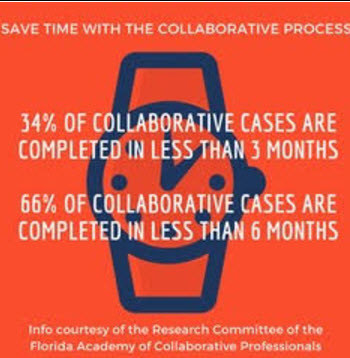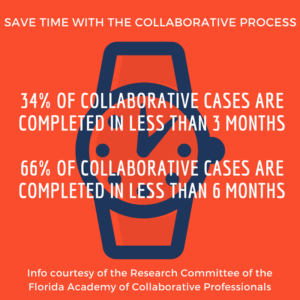

The video provides comments from members of the Florida Academy of Collaborative Professionals about the impact of the new legislation.
Visit our website at www.collaborativepracticeflorida.com
Benefits of the Collaborative Process
- Private – all information is kept confidential during negotiations unlike a court proceeding where all information is public record
- Child-centered – the best interests of the children are protected by all the professionals
- Client-controlled – the participants determine the pace of resolution and the outcome; instead of a stranger to the family
- Cost-effective – using the Collaborative Process can be less expensive than litigation
- Respectful – the professionals have all been trained to model and shape productive option building towards decisions that work for the entire family. Family relationships are preserved, not damaged.
- Team Approach – instead of relying solely on a lawyer for all aspects of the divorce, a professional team is formed with expertise in financial, relationship and parenting issues.
What is the Collaborative Process?
The parties each hire their own specially-trained attorneys. The parties and their attorneys meet jointly to privately and respectfully negotiate the settlement of all issues involved. A Participation Agreement is signed by all the parties and includes a commitment not to use court proceedings. Information and documents are voluntarily exchanged without the necessity of going to court. Mental health professionals act as facilitators to assist the parties with issues involving the couple’s children (custody, parenting plans) and to help them stay focused on resolving their differences rather than attacking each other. When there are financial issues involved, a neutral financial expert, such as a certified public accountant or a financial planner, is retained to gather information about the couple’s assets, liabilities, income and expenses, and to help the parties negotiate a settlement of their finances issues. If a settlement cannot be reached, the attorneys agree in the Participation Agreement that they must withdraw from further representation of the clients and cannot litigate the matter. This gives the attorneys an incentive to reach a fair settlement.






